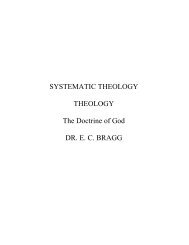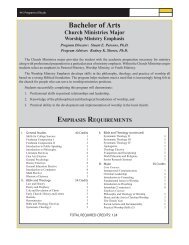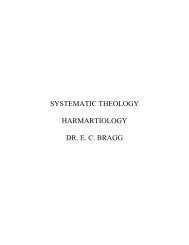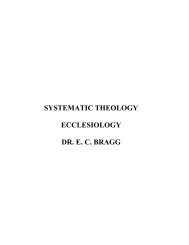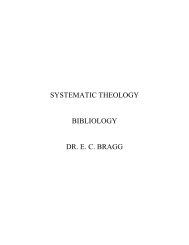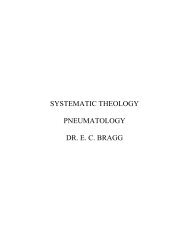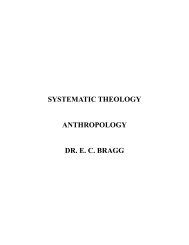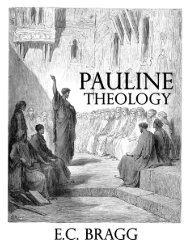SYSTEMATIC THEOLOGY SOTERIOLOGY DR ... - Trinity College
SYSTEMATIC THEOLOGY SOTERIOLOGY DR ... - Trinity College
SYSTEMATIC THEOLOGY SOTERIOLOGY DR ... - Trinity College
You also want an ePaper? Increase the reach of your titles
YUMPU automatically turns print PDFs into web optimized ePapers that Google loves.
makes God out a liar and man the truth. It rejects the verdict ofGod against sin and man, and, while rejecting the righteousness ofGod, goes about to establish its own righteousness.b.) The Substitution TheoriesWhile in this class, there is the confession of salvation as anobjective truth, wrought out by God for man and in man’s stead, there isa great line of divergence as to how this substitution is wrought, thevalue, the method, the reason, and the extent of the atonement. There arethree primary forms which have been taught, and with which we shalldeal, namely, the Commercial Theory, the Governmental Theory, andthe Satisfaction Theory. With many modifications the last theory is themost correct to Scripture.(1.) The Commercial or Anselmic TheoryIt is called the Anselmic theory because it was first held byAnselm, of Canterbury, (1033-1109) who is said to havepropounded the theory as an answer to the earlier wrong views ofthe atonement as a ransom paid to Satan. It is called thecommercial theory because it claims that Christ paid the exactequivalent for the deserved punishment of the elect; by this exactpayment, the elect are pardoned and regenerated. It can beadmitted that this theory helped much at the time of itsformulation to straighten out the views of sin as a debt to Godrather than Satan and sin as a crime; but it puts the atonement upontoo much of a commercial basis, so much payment for so manysins, and only for a certain elect, not for all, like Augustine. Thereare many other objections such as its failure to account for all thework of Christ and Scripture.(2.) The Governmental TheoryThis theory is so designated because it places Christ’satonement in its necessity, not because of the holiness of God, thepenalty of man, but in the upholding of God’s government. Itoriginated with Hugo Grotius, Dutch jurist and theologian (1583-1645) and has been accepted by the Armenians. The Methodistsare the chief upholders. Miley of Drew University was their chiefAmerican upholder. Miley says in his book on the atonement,"Imputation carried over no sin to Christ, hence no sin waspunished when He suffered," p. 193. Thus they teach Christsuffered no penalty at all. He was our substitution but not ourpenal substitute. The atonement was not to satisfy any internalHoly principle in God’s own nature, but only for the necessity ofhis government, to uphold his government. God must give anexample of how horrible sin is, so, in Christ, God graciouslyaccepts His atonement as a substitute for the penalty, but not theactual penalty. Miley, for instance, p. 191, could not be conscious



